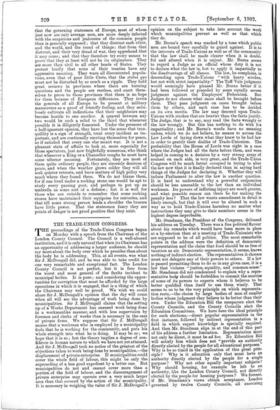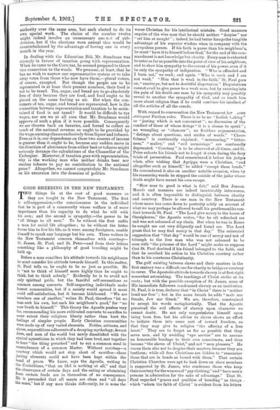THE TRADE-UNION CONGRESS.
T'proceedings of the Trade-Union Congress began on Monday with a speech from the Chairman of the London County Council. The Council is a well-abused institution, and it is only natural that when its Chairman has an opportunity of addressing a larger audience, he should say more about the body over which he presides than about the body he is addressing. This, at all events, was what Sir J. McDougall did, and he was able to take credit for one very remarkable and exceptional fact. The London County Council is not perfect, but it is free from the worst and most general of the faults incident to municipal bodies. It is pure ; and considering the oppor- tunities for corruption that must be afforded by the large operations in which it is engaged, that is a thing of which the Chairman may well be proud. We wish we could share Sir J. McDougall's opinion that the day will come when all will see the advantage of work being done by municipalities. Sir J. McDougall claims that the setting up of a Works Department has ensured work being done in a workmanlike manner, and with less supervision by foremen and clerks of works than is necessary in the case of private firms. We suppose that Sir J. McDougall means that a workman who is employed by a municipality feels that he is working for the community, and puts his whole strength into what he is doing. It may be so ; we hope that it is so ; but the theory implies a degree of con- fidence in human nature to which we have not yet attained. And Sir J. McDougall took no notice of the greatest of the objections taken to work being done by municipalities,—the displacement of private enterprise. If municipalities could cover the whole field of labour, this might be only the superseding of a less good expedient by a better one. But municipalities do not and cannot cover more than a portion of • the field of labour, and the discouragement of private enterprise may operate over a very much larger area than that covered by the action of the municipality. It is necessary in weighing the value of Sir J. McDougall's opinion on . the subject to take into account the -work which municipalities prevent as well as that. which they do.
Mr. Burns's speech was marked by a tone which public men are bound very carefully to guard against. It is to the interests of Trade-Unions as well as of the community that the law shall be made clearer when it is doubt- ful and altered when it is unjust. Mr. Burns seems to regard a Judge as an official whose duty it is not to declare what the law is, but to apply it impartially to the disadvantage of all classes. The law, he complains, is descending upon Trade-Unions " with heavy strokes, but not with strict impartiality." The Taff Vale judgment would seemingly have pleased Mr. Burns better if it had been followed or preceded by some equally severe judgment against the Employers' Federation. But Judges do not choose what cases shall be brought before them. They pass judgment on cases brought before them by others, and each case has to be decided on its own merits. The law may descend upon Trade- Unions with strokes that are heavier than the facts justify. The Judge, that is to say, may read the facts wrongly or the law wrongly. But this has nothing to do with his impartiality ; and Mr. Burns's words have no meaning unless, which we do not believe, he means to accuse the Law Lords of laying down what they knew to be bad law in order to gratify their dislike of Trade-Unionism. The probability that the House of Lords was right in a case where the Judges had all the facts before them, and were helped in coming to a decision by a very strong array of counsel on each side, is very great, and the Trade-Union Congress will be much better occupied in trying to alter the law now that it is finally declared than in saying hard things of the Judges for declaring it. Whether they will induce Parliament to alter the law is another question. It is hard to understand. why a powerful corporation should be less amenable to the law than an individual workman. Its powers of inflicting injury are much greater, and what possible reason can there be for making the penalty less ? That the law wants amendment in detail is likely enough, but that it will ever be altered in such a way as to hold Trade-Unions harmless no matter what instructions they may give to their members seems in the highest degree improbable.
Mr. Steadman, the President of the Congress, delivered his address on Tuesday. There was a fine political flavour about his remarks which would have been more in place at a by-election than at a meeting of Trade-Unionists who are supposed to be of all politics. The most remarkable points in the address were the definition of democratic representation and the claim that food should be as free of taxation as air. Democratic representation, it seems, knows nothing of indirect election. The representatives it chooses must not delegate any of their powers to others. If a law is passed permitting them to do so in any given case, it is a law that violates "justice, equality, and common-sense." Mr. Steadman did not condescend to explain why a repre- sentative body should be forbidden to commit the exercise of some of its powers to experts whom it believes to be better qualified. than itself to use them wisely. That seems to us to be the very principle on which representa- tion rests,—the choice by large bodies of men of smaller bodies whose judgment they believe to be better than their own. Under the Education Bill the ratepayers elect the County Councils, and the County Councils elect the Education Committees. We have here the ideal principle for such elections,—direct popular representation in the first instance, followed by indirect representation in a field in which expert knowledge is specially required. And then Mr. Steadman slips in at the end of this part of his address a further limitation. Representation must not only be direct, it must be ad hoc. No Education Bill will satisfy him which does not "provide an authority z directly elected by the people for all educational purposes." Why is he so timid in the application of this great prin- ciple ? Why is it education only that must have an authority directly elected by the people for a single purpose ? Why not other equally important subjects ? Why should housing, for example, be left .to an authority, like the London County Council, not directly elected by the people for housing purposes ? We foresee, 'if Mr. Steadman's views obtain acceptance, London governed by twelve County Councils, all exercising authority over the same area, but each elected to do its own special work. The choice of the number twelve might indeed involve an unnecessary arm u it of sub- division, but if the elections were annual this would be counterbalanced by the advantage of having one in every niontli in the year.
In dealing with the Education Bill, Mr. Steadman was strongly in favour of taxation going with representation. When he came to the Corn-tax, he seemed prepared to throw this connection to the winds. We presume, at least, that he has no wish to narrow our representative system or to take away votes from those who now have them,—plural voters, of course, excepted. But though the people are to be represented in at least their present numbers, their food is not to be taxed. Tea, sugar, and bread are to go absolutely free of duty because they are food, and food ought to be placed on the same footing as air. But when the con- sumers of tea, sugar, and bread are represented, how is ,the connection between representation and taxation to be main- tained if food is not taxed ? It would be difficult to tax wages; nor are we at all sure that Mr. Steadman would approve of such a plan if it were- possible. Consequently we are thrown back on luxuries, and forced to collect so much of the national revenue as ought to be provided by the wage-earning classes exclusively from liquor and tobacco. Even as it is, our dependence on these two sources of income is greater than it ought to be, because any sudden move in the direction of abstinence from either beer or tobacco might seriously derange the calculations of the Chancellor of the Exchequer. Moreover, if taxation goes with representation, why is the working man who neither drinks beer nor smokes tobacco to pay no contribution to the national purse ? Altogether, we cannot congratulate Mr. Steadman on his excursion into the domains of politics.







































 Previous page
Previous page